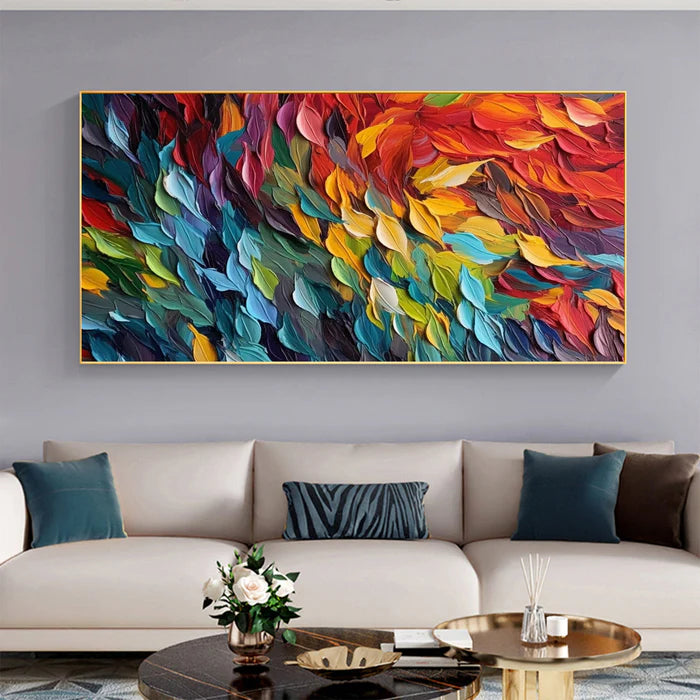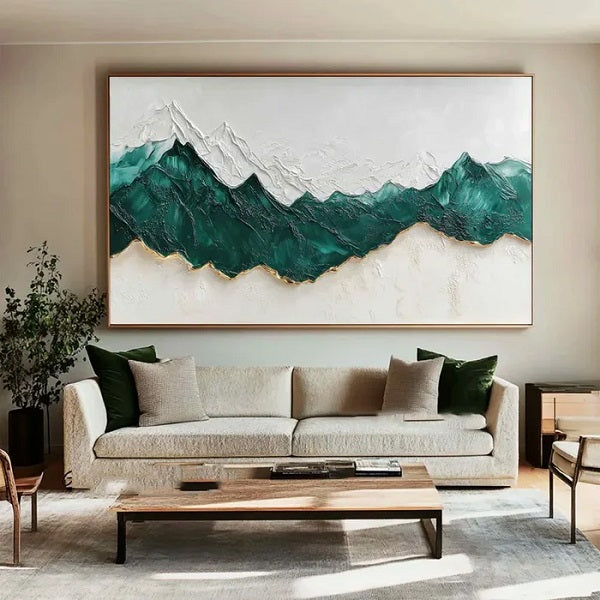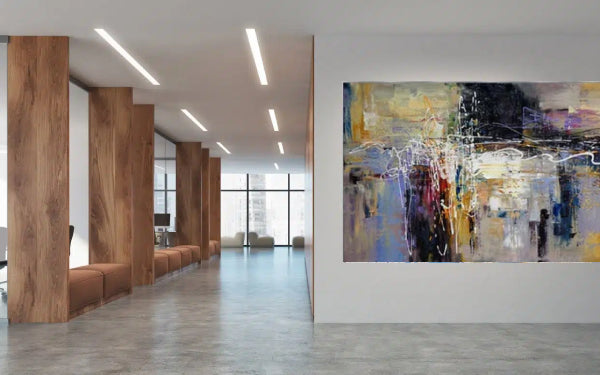The Art of Simplicity - Creating Character with Less
When people hear "minimalist decor," they often picture stark, empty white rooms that feel cold and impersonal. But what if we told you that true minimalism isn't about emptiness, but about intention? It's the art of using less to create more feeling, more character, and more calm. If you're looking for minimalist wall decor inspiration that is anything but boring, you've come to the right place. Here are 10 ideas to prove that simplicity can be absolutely stunning.

Idea 1: Embrace Texture with a White Minimalist Painting
The number one secret to making minimalism interesting is texture. A white minimalist painting with rich, sculptural textures is a perfect example. It maintains a clean, serene color palette while adding incredible depth and character to your wall.
The Power of Tactile Details
A textured surface interacts with light throughout the day, creating subtle shadows and highlights that bring the wall to life. This tactile quality provides a layer of visual interest that a flat, printed piece simply cannot match. It’s a sophisticated way to add warmth to a minimalist space. You can find stunning examples in our .
Idea 2: Create Balance with a Set of 2 Wall Art (Diptych)
Minimalism loves order and balance. A diptych, which is a piece of art made of two matching panels, is a perfect way to achieve this. A set of 2 wall art creates a sense of harmony and intentionality that feels both modern and timeless.

The Harmony of a Matched Pair
Placing two coordinated pieces side-by-side provides a pleasing sense of symmetry and rhythm. It’s an elegant solution for the space above a sofa or a long console table, filling the wall without creating clutter. to create your own balanced look.
Idea 3: Play with Subtle Geometry
Minimalist design often celebrates geometry and clean lines. Incorporate this by choosing abstract art with simple, defined shapes. A painting featuring a single circle, a series of lines, or a pair of intersecting rectangles can add structure and a modern edge to your decor.

Clean Lines and Simple Shapes
Geometric art doesn't need to be loud or complex. The beauty lies in its simplicity. It complements a minimalist aesthetic by reinforcing the principles of order, precision, and clarity, adding interest without visual noise.
Idea 4: Use a Neutral Textured Wall Art Piece as an Anchor
While white is a minimalist staple, don't overlook the power of other neutrals. A neutral textured wall art piece in shades of beige, grey, or soft brown can serve as a calming anchor for your room.

The Warmth of Earth Tones
These earthy tones bring a natural, organic warmth that can keep a minimalist room from feeling cold. The added texture ensures the piece still has plenty of character and depth. This approach is central to creating a welcoming and serene minimalist decor.
Idea 5: A Single, Oversized Statement Piece
Sometimes, one is all you need. Instead of several small items, consider a single, oversized statement piece. A large-scale abstract painting can command a wall and define the entire room with confidence and clarity.
The "Less is More" Philosophy in Action
This approach is the ultimate expression of the "less is more" philosophy. One impactful piece makes a stronger statement than a dozen smaller, competing items. It demonstrates a commitment to quality over quantity, which is the heart of minimalism.
Idea 6: Introduce an Organic Shape
To soften the straight lines and hard angles often found in minimalist spaces, introduce an organic shape. Look for artwork with flowing, curved lines or forms that feel inspired by nature.
Abstract Forms Inspired by Nature
An abstract painting that hints at a wave, a cloud, or a smooth stone can provide a beautiful contrast to modern furniture. It brings a touch of softness and natural serenity to the room, connecting your indoor space with the outside world.
Idea 7: The Elegance of a Line Drawing
For ultimate simplicity, nothing beats the elegance of a line drawing. This art form uses a single, continuous line or a few simple strokes to create a compelling image.
Maximum Impact with Minimal Detail
Line art is proof that you don't need a lot of detail to make a big impact. Its beauty lies in its restraint and its ability to convey so much with so little. It is the epitome of sophisticated, uncluttered design.
Idea 8: A Touch of Black for Dramatic Contrast
A pop of black in an otherwise light and neutral room is a classic designer trick. A minimalist painting that incorporates bold black elements can create a dramatic, high-contrast focal point.
The Power of a Monochrome Palette
A monochrome black-and-white palette is timeless and incredibly chic. It adds a graphic, powerful element to your minimalist decor without introducing distracting colors, keeping the overall aesthetic clean and focused.
Idea 9: Floating Frames for a Clean Finish
How you frame your art is just as important as the art itself. For minimalist pieces, a floating frame is the perfect choice. The canvas "floats" inside the frame with a small gap, creating a gallery-quality, polished look.
How Floating Frames Enhance Minimalist Art
This style of frame provides a crisp, clean edge to the artwork without adding any bulky or ornate decoration. It enhances the art without distracting from it, perfectly aligning with the principles of minimalist design.
Idea 10: Let the Art Breathe with Negative Space
Our final idea is about what you don't do. Embrace negative space. A minimalist wall is not meant to be filled from corner to corner. Leaving plenty of empty space around your artwork is essential.
The Importance of Uncluttered Walls
This "breathing room" allows your chosen piece to truly shine and have the impact it deserves. An uncluttered wall creates a sense of calm and allows the eye to rest, making the entire room feel more peaceful and intentional.
Minimalism is Anything But Monotonous
As you can see, minimalist decor is far from boring. It's a thoughtful, intentional approach to design that creates a space of calm, character, and sophisticated beauty. By focusing on texture, balance, and a few carefully chosen statement pieces, you can create a minimalist home that is rich with personality. Which minimalist idea is your favorite to try?
FAQ: Your Questions About Minimalist Decor
How do I keep a minimalist room from feeling cold? The key is to introduce warmth through texture and natural materials. A heavily textured painting, a soft wool throw, a light wood coffee table, or a few plants can instantly make a minimalist space feel cozy and inviting.
Can I use color in minimalist design? Yes! Minimalism isn't strictly about neutrals. You can use color, but the key is to be intentional. Often, this means using a single, bold accent color in an otherwise neutral room, for example, through one stunning piece of art.
How many pieces of art should I hang in a minimalist living room? There's no hard rule, but "less is more" is a good guideline. Often, one large statement piece is more effective than many small ones. If you're creating a gallery wall, keep it clean and symmetrical with matching frames.
What is the difference between minimalism and Wabi-Sabi? While both value simplicity, minimalism often strives for clean lines and modern perfection. Wabi-Sabi, which we explore in another




